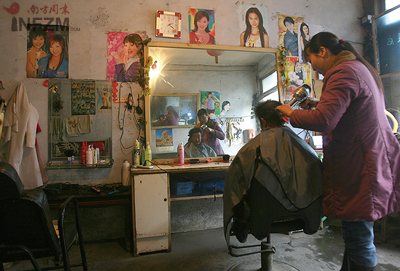Personal fate
When opportunities crop up, different people make different choices depending upon their diverse experiences, horizons and access to varying amounts of information. People head for unusual fates that are inextricably intertwined with China's changing society.
 |
|
In a shabby barbershop, there is not much business.
|
Mr. Zhu epitomized all that modern China has gone through. He formerly worked in a collective firm in Bailu Town. After it went bankrupt he began to make his fortune as a roadside shopkeeper. It was not a good business because the biggest supply and marketing cooperative lay just opposite the road. His big break came when his rival closed down in favor of the private economy. This gave the upper hand to Mr. Zhu because his store was bigger.
Cai Yanzhen got married in 1999 and settled down in Anhai Town. She started her career by opening a hotpot restaurant on Chenggong Road. But in 2002, the female restaurateur, hit by a tax burden and slack economy, went bankrupt. But failure didn’t frustrate her: she took a job as an insurance broker. This position required good connections. Soon she tasted failure again after smarting from the head-to-head competition in this field. At the end of 2004, she returned to familiar ground running a beef hotpot stall on the Chenggong road. Her former experience as a restaurant owner soon helped her to succeed. On her busiest days, she sells almost 30 kilograms of beef. She does business almost everyday, rain or shine.
Cai Yanzhen is just one of the millions of people participating in fueling the national economy through hard work.
Over those years, Xiaochangzhuang has suffered greatly from its inability to find a suitable variety of crops for villager farmers to cultivate. Early in 1998, they grew pears but later most people quit; in 2000, the local government gave them a mandate to grow capsicums but the venture failed. Although well intended, the order took a terrible toll on local agriculture.
But a handful of people in the village who marched to a different drummer have worked a quicker way out of poverty. Chang Jinchun who had previously worked as a migrant worker for four years in Shenzhen, a vibrant metropolis in south China, reaped vast profits after he started up a business back in his home village. In 2002, he got a large parcel of land and created a profitable plantation. Neighbors said that he was always good at devising ways to earn money.
Human and environment
Humans and their environment is the hottest topic these days. Since 1999 Bailu town has experienced negative population growth. In Xiaochangzhuang village, an aging population was reported.
In the last decade, slowed population growth signified a new trend. According to the State Statistics Bureau, the natural population growth rate rested above 1 percent before 1997 but it began to decline in 1998. With a quicker urbanization process coupled with the one-child policy, China will definitely slow its pace of population growth. The peak in this slow growth will arrive earlier than expected, in the middle-and-late 2020s.
Goldman Sachs predicts men above 65 will have quadrupled their current number by 2050, making the ratio of older to younger people alarming.
The sizzling economy has blighted the environment in Bailu Town with a string of lime and cement mills. In 1999, the sound of blasting in the nearby mountains could be heard in each corner of the road. The town was crammed with small lime mills that spewed out irritating smoke. So many coal-washing factories operated that the local river was dyed black.
To preserve the natural landscape, quarry activities have been banned since 2000; small lime mills and coalmines have been shut down. The ailing Bailu River which once succumbed to coal sediments and toxic mine drainage has recovered after pollution treatment in 2004.
Bailu Town could invigorate its economy with tourism, while many other sister towns and cities fret with environmental issues. How to balance environmental and economic developments in the future remains a tough nut to crack in China.
A significant social reform can be fully understood only when it nears its end. What is the future for Bailu Town, Xiaochangzhuang Village, Chenggong Road, and China? We will seek the answer while continuing to move forward.
(China.org.cn by He Shan, December 22, 2008)